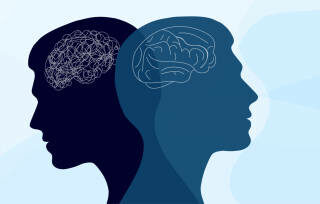As our daily lives are increasingly spent online, we are having less direct face-to-face interaction with others. This trend can impact mental health, as individuals may struggle to distinguish between the seemingly perfect online world and reality. As a result, it may be more challenging for people to open up and discuss personal issues with others, fearing judgment. This was particularly evident during the COVID-19 pandemic, as WHO studies show that suicide is the fourth leading cause of death among 15–29-year-olds. Simultaneously, the AI revolution has the potential to make mental health services more accessible to the public. With mental health systems under increasing pressure, could AI be the answer?
The potential of AI to advance public health is enormous. With its ability to identify and monitor mental health problems, automate tasks for patients, and use digital health data, policymakers can make informed decisions to improve the health of populations. However, to make the most of this technology, we need to innovate and develop predictive analytics on big data. AI can help diagnose conditions, develop treatments, and enable personalised approaches to healthcare. For example, AI chatbots using conversational exercises can predict patient non-compliance with therapy or prescribed treatments and identify cases where cognitive behavioural therapy is likely to be more effective than medication. However, it is important to monitor these chatbots and ensure that the AI-generated data is understandable to healthcare professionals who are not AI experts as the use of AI in this particular industry faces several challenges.
Research on the use of AI in mental health has mainly concentrated on psychotic disorders, such as depression and schizophrenia. However, there is a significant gap in understanding how AI can be used to study other mental health disorders. Furthermore, concerns about bias in AI are based on complex statistics, mathematical approaches, and high-dimensional data that can lead to inaccurate interpretation of results. AI may perpetuate diagnostic bias in mental health treatment without proper oversight and legal guidelines. For example, gender biases may occur due to the fact that AI is mostly created by men. Therefore, it is important to note that AI output is not subjective. However, in healthcare, it is crucial to acknowledge that available medical data is skewed towards males as females are often excluded from biomedical, clinical, and public health research. Mental disorders pose gender-specific risks, indicating that mental health treatment cannot be gender-neutral. However, there is limited research on how AI and gender biases could impact the mental health care sector.
Furthermore, AI’s lack of empathy and understanding of human emotions poses a further challenge to its use in this area. While large datasets can inform treatment decisions, relying solely on them neglects the importance of the patient’s self-reported emotions and the healthcare provider’s judgement. It is therefore crucial to establish guidelines to properly oversee the performance of AI and to prioritise data protection and privacy in mental health care. By doing so, we can ensure that AI is used effectively and safely to improve mental health outcomes for all individuals, regardless of gender or mental health diagnosis.
In conclusion, AI has the potential to improve the accessibility and efficiency of mental healthcare for patients, particularly if systems can predict future patient behaviour. However, recent studies have lacked the necessary data to diversify the use of AI in the mental health sector, and legal regulations regarding privacy and adequate monitoring of AI systems are lacking. Nevertheless, it is worth monitoring the future progress of researchers and AI.
Sources:
Afifi, M. (2007) Gender differences in mental health. Singapore Med Journal; 48 (5):385
Hariharan, K. (2020) How Will AI Affect Gender Gaps in Health Care?. Available at: https://www.marshmclennan.com/insights/publications/2020/apr/how-will-ai-affect-gender-gaps-in-health-care-.html
Marr, B. (2023) AI in Mental Health: Opportunities and Challenges in Developing Intelligent Digital Therapies. Available at: https://www.forbes.com/sites/bernardmarr/2023/07/06/ai-in-mental- health-opportunities-and-challenges-in-developing-intelligent-digital-therapies/
Smith, G., and Ishita R. (2021) When Good Algorithms Go Sexist: Why and How to Advance AI Gender Equity. Stanford Social Innovation Review. https://doi.org/10.48558/A179-B138.
WHO (2023) Artificial intelligence in mental health research: new WHO study on applications and challenges. Available at: https://www.who.int/europe/news/item/06-02-2023-artificial-intelligence-in-mental-health-research–new-who-study-on-applications-and-challenges


